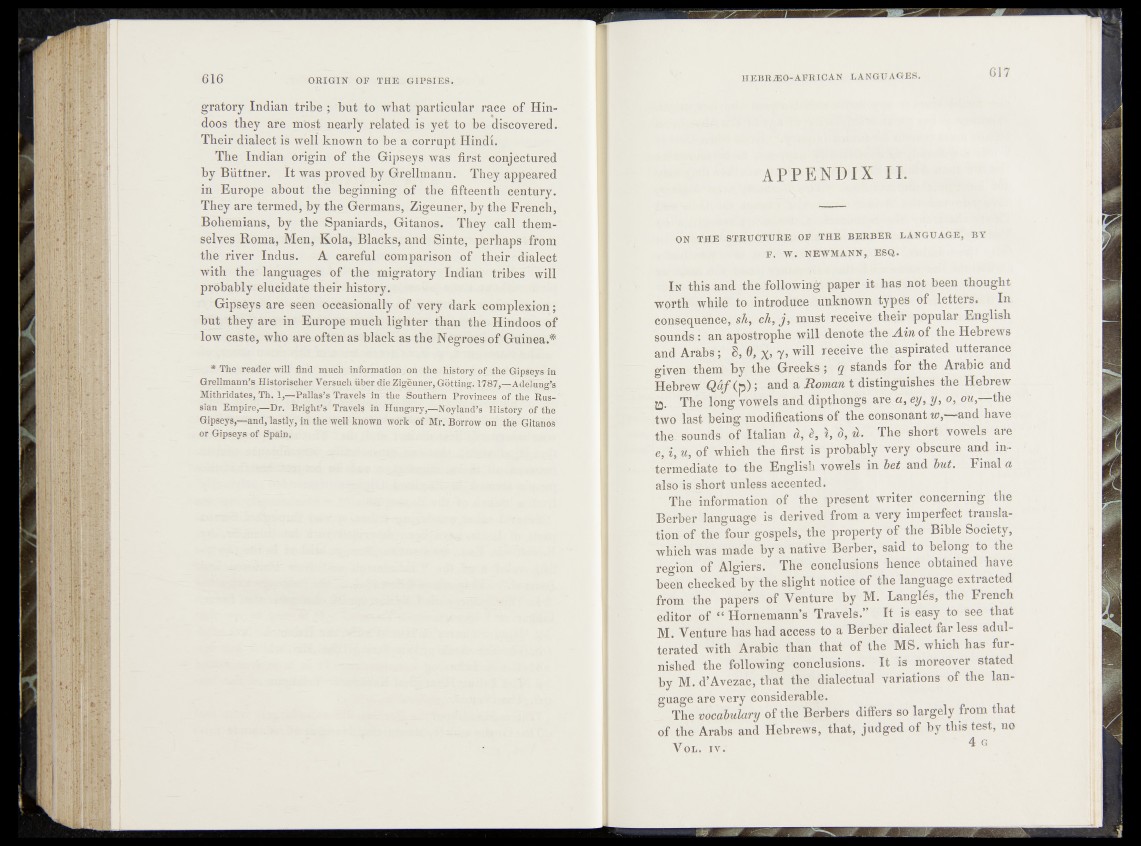
gratory Indian tribe ; but to what particular race of Hindoos
they are mDSj; nearly related is yefc h r be-discovered.
Their dialect is well known to be a corrupt Hindfe\/
The Indian origin of the Gipseys was first conjectured
by Bfittner. It was proved by Grellmann. > -T^ey. appeared
in Europe about the beginning of the fifteenth century.
They are termed, by the Germans, Zigeuner, by the French,
Bohemians, by the Spaniards, Gitanos. They call them-'
selves Roma, Men, Kola, Blacks, and Sinte, perhaps from
the river Indus. A careful comparison of their dialect
with the' languages of the migratory Indian tribes will
probably^elucidate their history.
Gipseys are seen occasionally of very dark complexion;
but they are in Europe much lighter than the Hindoos of
low caste, who are often as black as the- Negroes of Guinea.*
* The reader will find Brash (fhe^fiiBte^o^hjgtedpseys in
Grellmann’s Historischer Versuch fiber die ^geun^Got-tipg. lt^mAdatung’a
Mithridates, Th. ly—Pallas’s Travels in the Southern Provinces, of the'Bus-'’
sifiiT Eifipire,—Dr. Bright's'Tfav® in Hungary^klfl^nd’s History
Gipseys,—andj lastly, in the well known work'of Mr. Borrow on ffie Gitanos
or Gipseys of Spain,
A P P E N D I X I I .
ON THE STRUCTURE OF THE BERBER LANGUAGE, BY
F. W. NEWMANN, ESQ.
In this and the following paper it has not been thought
worth while to introduce unknown types of letters. In
consequence, sh, ch, j , must receive their popular English
sounds : an apostrophe will denote the Ain of the Hebrews
and Arabs; 8, 0, y, will receive the aspirated utterance
given them by the Greeks; g stands for the Arabic and
Hebrew'Q«/(p); and a Roman t distinguishes the Hebrew
The long vowels and. dipthongs are a, ey, y, o, 03#,—the
two last being modifications of the consonant«?,—and have
the. sounds of Italian «, £, l, o, d. The short vowels are
e, i, u, offwhich the first is probably very obscure and intermediate
to the English vowels in let and but. Final a
also is short unless accented.
The information of the present writer concerning the
Berber language is derived from a very imperfect translation
of . the four gospels, the property of the Bible Society,
which was made by a native Berber, said to belong to the
region of Algiers. The conclusions hence obtained have
been checked by the slight notice of the language extracted
from the papers of Venture by M. Langl6s, the French
editor of “ Hornemann’s Travels.’’ > It is easy to see that
M. Venture has had access to a Berber dialect far less adulterated
with Arabic than that of the MS. which has furnished
the following conclusions. It is moreover stated
by M. d’ Avezac, that the dialectual variations of the language
are very considerable.
The vocabulary of the Berbers differs so largely from that
of the Arabs and Hebrews, that, judged of by this test, no
V oL . IV.' ^ G